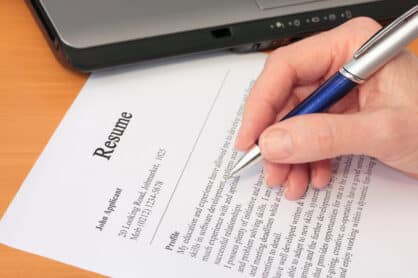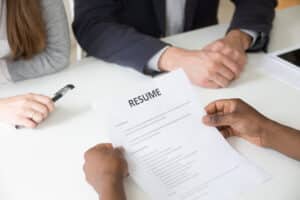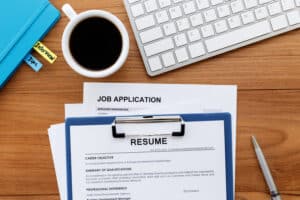Career Advice
This Article Talks About:
Home » Resume | CV Writing » Why you need to customize your Resume for every job application
Why you need to customize your Resume for every job application
https://www.whatjobs.com/info/resume-cv-writing-advice/why-you-need-to-customize-your-resume-for-every-job-application

Do you know how a well-crafted resume boosts your likelihood of hearing back from the hiring manager?
HR teams are canny, they’ll be able to recognize a generic resume that’s been sent hundreds of times.
The fact is, you need to scrap the one-resume-fits-all rule and put some extra work in.
Tweaking your resume for each application will show you have attention to detail, which is likely to catch the recruiter’s eye.
This guide will provide practical steps to make you a skilled resume writer.
READ MORE: Writing A Career Change Resume: A Guide For The Aspiring Job Shifter
Understand the Job Description
Before you embark on customizing your resume, take the time to read and understand the job description thoroughly.
Highlight the key skills, qualifications, and experiences the employer is looking for.
Doing this gives you valuable insights into what the employer is looking for in a candidate.
This understanding will enable you to align your resume with their expectations, making it more relevant and appealing.
It also gives you the chance to look at learning about some of the skills the employer asks for you may not have.
Start with a Strong Profile
The first section of your resume should be a powerful profile showcasing your professional experience and highlighting your most relevant skills.
Modify this section to emphasize the aspects of your background most closely related to the job requirements.
Use keywords from the job description to ensure your profile aligns with what the employer is seeking.
This could well encourage the recruiter to delve deeper into your application.
Prioritize Relevant Experience
When tweaking your resume, your work experience section is paramount.
Review and rework your previous roles and responsibilities and rearrange the list based on the relevancy to the position you are applying for.
Focus on accomplishments and quantifiable achievements that demonstrate your abilities and impact.
Avoid including irrelevant or generic experiences that do not add value to your application. The recruiter doesn’t need to read 300 words on a job you had aged 16 – unless it’s very relevant.
The relevant experience section showcases your ability to excel in the role you’re applying for.
Highlight Key Skills
Employers often have specific skill sets in mind when searching for candidates.
To customize your resume effectively, identify the key skills mentioned in the job description and make sure they are prominent in your application.
You can create a dedicated “Skills” section or incorporate relevant skills throughout your resume.
These can be included in your profile, work experience descriptions, or a separate “Key Achievements” section.
By demonstrating that you possess the required skills, you make a strong case for why you are the right fit for the job.
READ MORE: How To Write A Cover Letter
Showcase Achievements and Results
Recruiters are not only interested in your responsibilities; they want to see what you have achieved in your previous roles.
Quantify your achievements whenever possible to provide concrete evidence of your capabilities.
For example, instead of saying you “increased sales,” specify that you “increased sales by 20 percent within six months.”
They say the “devil’s in the detail” and you can definitely make a mark if you’re able to wow the interviewer with some impressive numbers.
Highlighting your accomplishments increases your credibility and demonstrates a results-oriented approach.
Adapt Your Education and Training
Although your education section is unlikely to change much , you can still tailor it to highlight relevant coursework, certifications, or any training you’ve done.
If you have completed qualifications directly related to the job you are applying for, ensure they are prominently displayed.
And if your CV is a bit light due to a lack of experience, you can expand on relevant coursework, research projects, or extracurricular activities, demonstrating your skills and dedication.
Customize Additional Sections
Beyond the core sections of your resume, such as work experience and education, you should customize other areas to further align with the job requirements.
For example, if the role emphasizes teamwork and collaboration, include a “Teamwork and Collaboration” section where you can highlight group projects or cross-functional initiatives you have participated in.
This demonstrates your ability to work well with others and adds depth to your application.
Be Mindful of Formatting
While the content of your resume is crucial, don’t overlook the importance of formatting and presentation.
Ensure your resume is clean, well-organized, and easy to read.
Use bullet points to highlight key information, and make sure your headings and subheadings are clear and distinct.
Pay attention to font choice, font size, and overall layout consistency.
A polished and visually appealing resume will leave a positive impression on the recruiter.
Proofread and Edit

Before submitting your sparkly new resume, proofread it thoroughly for grammatical errors, typos, or inconsistencies.
You could have the best-designed resume perfectly showcasing everything you need to get the job, but the interviewer will zone in on any typos or grammar errors.
Simple mistakes can quickly undermine a meticulously crafted resume.
Use online grammar checkers, seek feedback from friends or family members, or consider working with a professional editor to ensure your resume is error-free.
READ MORE: How To Write A Good Resume
Continuously Update and Adapt
Tailoring your resume should not be a one-off.
As you progress in your career or apply for different positions, continuously update and adapt it to reflect your latest experiences and achievements.
This might seem like a pain at the time, but it’ll ultimately mean any further editing your resume needs for job applications will be a lot quicker and easier.
A good idea is to keep a master resume document that includes all your relevant experiences and accomplishments and use it as a foundation to create modified versions for specific job applications.
Review and refine your resume to remain up-to-date and aligned with your career goals.
Final Thoughts
So, there you have it.
With each tweak and adjustment, you’re shaping a resume that fits like a tailored suit for every job opportunity.
Just remember, you’ll have to do this each time you apply for a job.
Keep updating and adapting your resume as your career journey unfolds. Let it reflect your growth, achievements, and aspirations. Happy job hunting!















